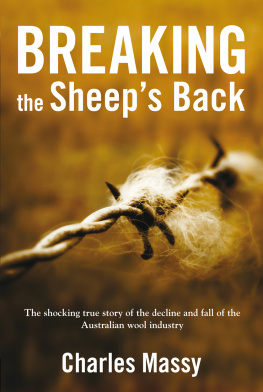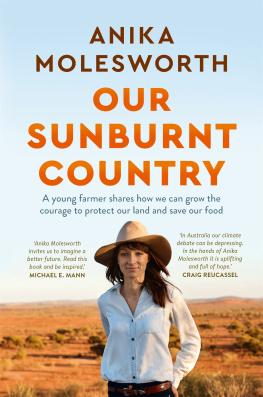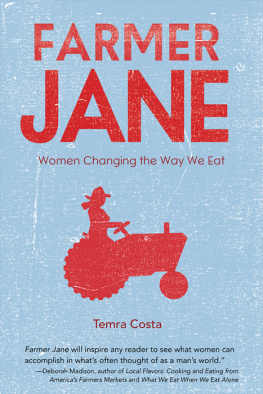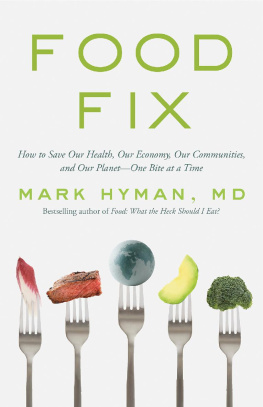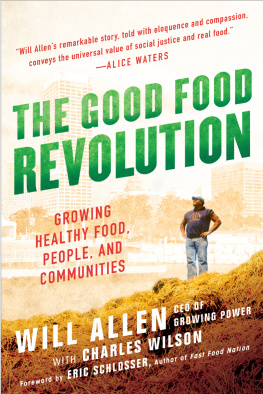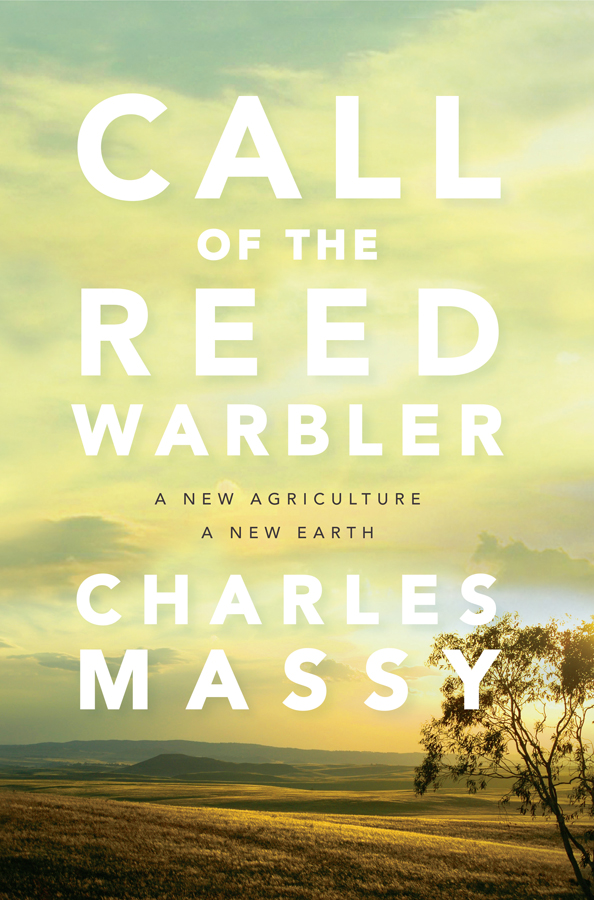Charles Massy gained a Bachelor of Science at ANU in 1976 before going farming for 35 years and developing the prominent Merino sheep stud Severn Park. Concern at ongoing land degradation and humanitys sustainability challenge led him to return to ANU in 2009 to undertake a PhD in Human Ecology. Charles was awarded an Order of Australia Medal for his service as Chair and Director of a number of research organisations and statutory wool boards. He has also served on national and international review panels in sheep and wool research and development and genomics. Charles has authored several books on the Australian sheep industry, the most recent being the widely acclaimed Breaking the Sheeps Back (UQP 2011), which was short-listed for the Prime Ministers Australian Literary Awards in Australian History in 2012.
Advance praise
Sun, soil, water, fire, carbon: this book addresses the future of life plant, animal and human. It explains how regenerative agriculture rescues and resurrects decayed land. Profound, complex, anecdotal, it wants to change the world. It could be the most important book you will ever read.
Bill Gammage, author of The Biggest Estate on Earth
Massy tells the sad story of Australian industrial agriculture and then proceeds to tell us stories of hope.
Patrice Newell, author of The Olive Grove and The River
This is a marvellous book, full of wonder and wisdom, and is both visionary and deeply practical. It is a humble, lyrical and learned journey into the past and future of Australian land and nature. Charles Massy is an Australian Rachel Carson, our Aldo Leopold of the Monaro. A magnificent achievement.
Tom Griffiths, Professor of History, Australian National University
Whether you work the land or benefit from the food and fibre it produces, you should read this important book. It is written with passion and clarity, describing and analysing the revolution in thinking about our land that could make farming and grazing sustainable.
Ian Lowe, author of The Lucky Country? and Bigger or Better
Call of the Reed Warbler is full of stories and evidence of agricultural practices that are, at last, truly suited to Australia. The relevance, though, is global. This is not just a book for those interested in agriculture and healthy landscapes, but for anyone interested in our future.
Dean Revell, independent scientist, Revell Science, and adjunct associate professor, University of Western Australia
Much has been written on the global imperative to create a truly regenerative agri- culture . We understand the underlying theory, but on-ground practice remains the challenge. Massys book is a deeply reflective exploration of the theory of regenerative agri-culture, but what makes it truly convincing is its solid grounding in personal on-farm experience and inspiring tales from fellow regenerative farmers. His discourse is well informed by a great breadth of literature that provides the critical context for his hopeful stories of the emergence of regenerative farm practice on our ancient Australian landscapes.
David Freudenberger, Australian National University
In this wondrously evocative multi-layered work, Charles Massy draws on an extraordinarily rich reserve of knowledge and wisdom gleaned from the experiences of others with whom he critically engages, from a wide variety of different scientific disciplines, and from different ways of knowing and appreciating that reflect profoundly different worldviews. But far beyond this, Massy provides an outstanding synthesis of thought, feelings, values and actions in answer to the poignant call of the reed warbler, which he presents as a metaphoric clarion for us humans to once more become the enablers, the nurturers, the lovers of a self-organising and regenerative earth as we face up to the challenges of the emergent age of the Anthropocene.
Richard Bawden AM, Professor Emeritus,
Western Sydney University
Now is the time to radically change the way we farm in this country. In regenerating the five landscape functions solar, water, soil, community dynamics and society Massys interviewees (and himself on his own property), often influenced by Aboriginal land-management techniques, demonstrate how we can farm with, not against, nature. It is ultimately uplifting: Massy offers hope that we are finally learning to belong to this landscape, rather than attempt to mould it to a culturally transplanted ideal. For Charles Massy, there has never been a more exciting time to be an Australian farmer.
Sam Vincent, farmer and author
Contents
by Valerie A. Brown
In Call of the Reed Warbler Charles Massy has created an inspiring book that speaks to us all. Everyone rural and urban, industrialised and traditional, old and young has crucial connections to the land. From their very beginnings, humans have drawn on the land for food, shelter, water, clean air, physical resources and a sense of place. The land itself has its own existence, with its food chains, energy flows, water cycles, DNA patterns and the Gaian integrity described by industrial chemist James Lovelock. The age-old feedback systems between humans and the land have always determined how people live. Now humans have powerful tools that affect the state of the environment in return; a comparatively recent condition. The canvas on which all this takes place is so vast that it is difficult to grasp the whole story.
Call of the Reed Warbler offers a challenging account of the possible future of the complex humanland relationship. Massy draws on interwoven stories of his own and other farmers lives to represent the whole humanenvironment journey. His sensitivity to the land is so acute that it allows the reader to travel with him across the landscape. The main theme is the emergence of a regenerative era in which humans match their interventions to the inherent ways of the land. This has been called listening to the land.
A regenerative world builds on the past and looks to a new and rewarding future created by partnership with the land. One story tells of a third-generation farmer, Colin Seis, whose property was stripped by fire: no house, no pasture and no stock, and a large debt to the commercial agencies who had supplied seed and fertilisers. After an initial deep depression, tuning in to the way the land itself could support him gave him the strength to start again from scratch. This in turn led him to a weekend workshop on holistic farming. Holistic here meant taking the well-being of land, stock, family, colleagues, income, society, previous work and the future into account. The outcome was a regenerative state for both himself and the land.
A philosopher, Thomas Berry, describes the present as one of the key moments in history when humans and the environment share the choice of moving in a new direction. He calls this a moment of grace, a time when a new way of thinking means all things are possible. Berry identifies the taming of fire and the invention of the wheel as moments in human history that changed the relationships between humans and the land forever. Massy finds a moment of grace in the present. He foresees that mutual learning systems between humans and landscapes are developing a regenerative relationship that could extend to the whole of life on the planet.


